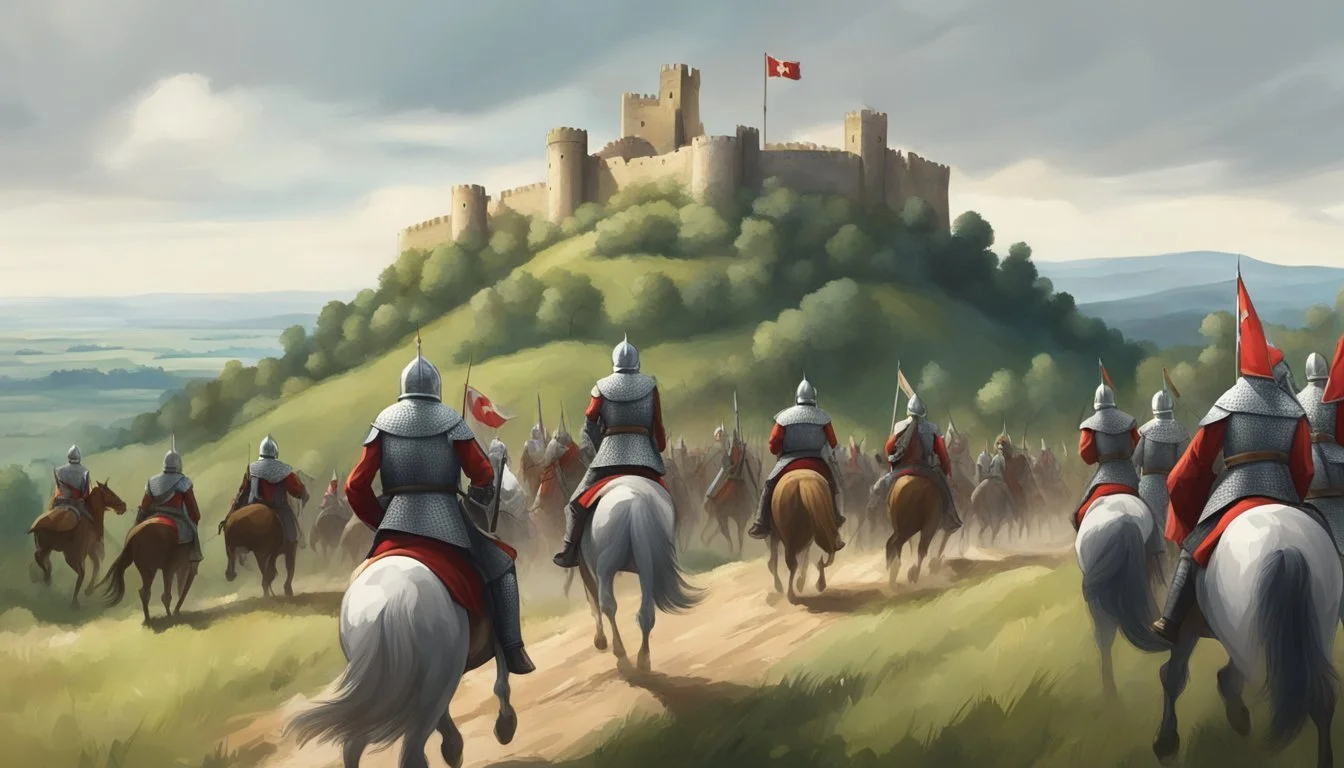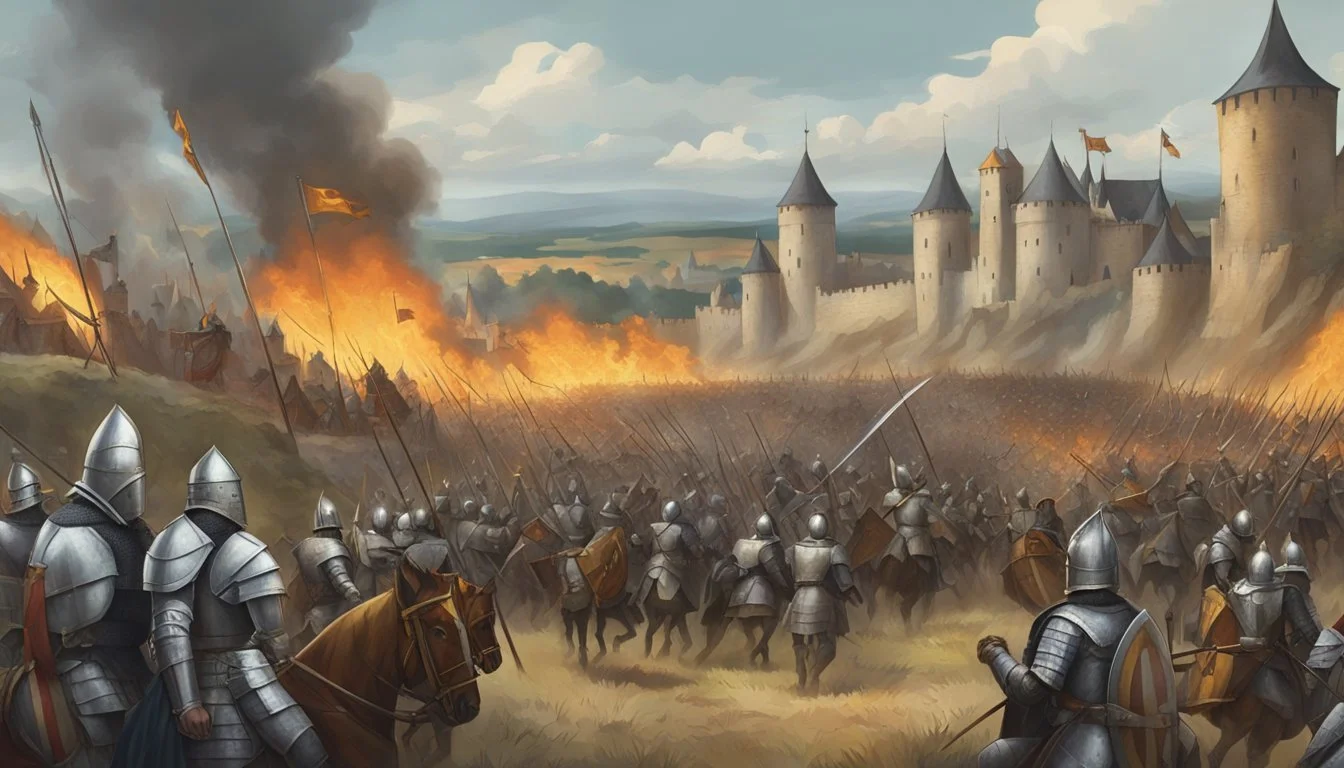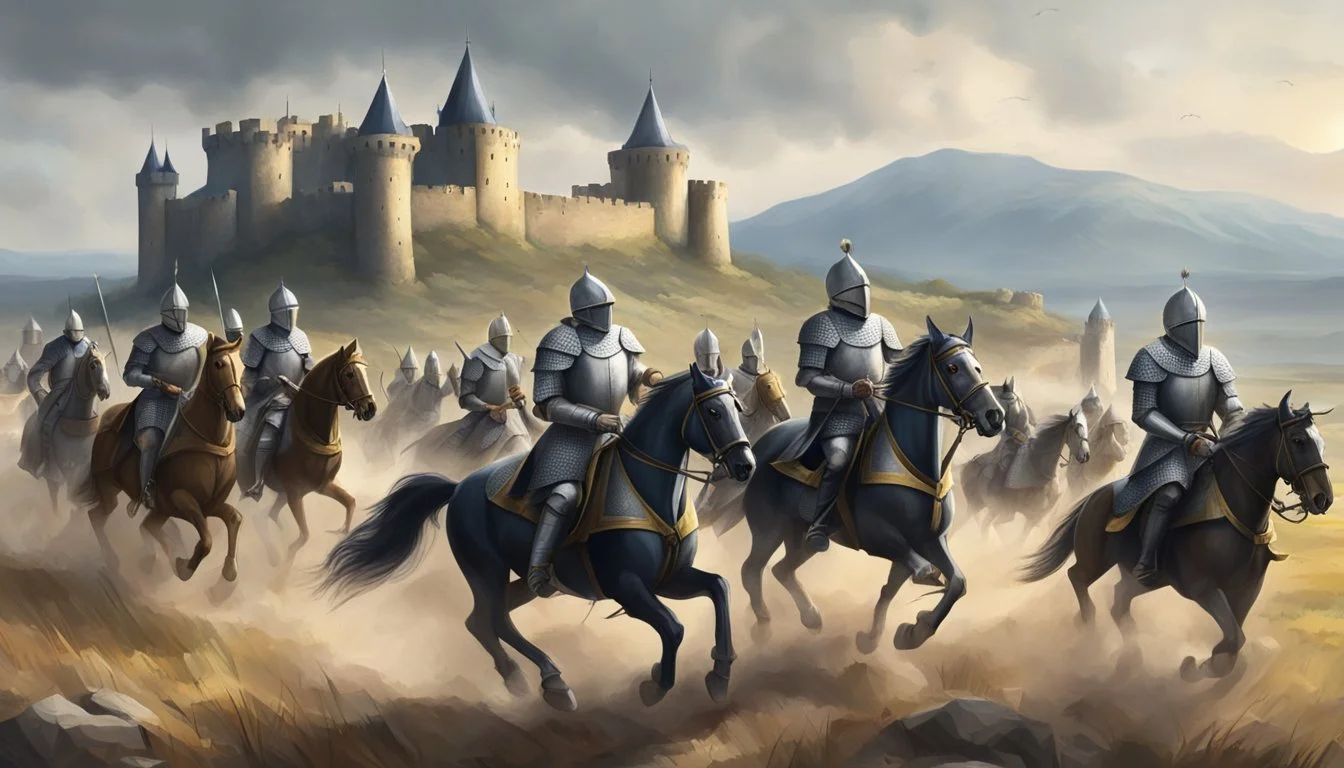10 Insightful Films on the History of the Crusades
A Cinematic Journey Through Medieval Holy Wars
The Crusades, a series of religious wars that spanned centuries, have captivated filmmakers and audiences alike. These historic conflicts between Christians and Muslims over control of the Holy Land provide rich material for cinematic storytelling. From epic blockbusters to thoughtful documentaries, films about the Crusades offer viewers a window into this tumultuous period of history.
Films exploring the Crusades blend historical fact with dramatic interpretation, offering insights into the motivations, struggles, and consequences of these religious wars. Some focus on legendary figures like Richard the Lionheart or Saladin, while others examine the experiences of common soldiers and civilians caught in the conflict. Through various genres and perspectives, these movies bring the medieval world of the Crusades to life on screen.
1) Kingdom of Heaven
Ridley Scott's epic historical drama "Kingdom of Heaven" offers a compelling glimpse into the tumultuous world of the Crusades. Set in the 12th century, the film follows Balian of Ibelin, a blacksmith who becomes embroiled in the complex political and religious conflicts of Jerusalem.
The movie explores themes of faith, tolerance, and the struggle for power during a pivotal moment in history. It portrays the delicate balance between Christians and Muslims in the Holy Land, highlighting the tensions that ultimately led to war.
While taking some liberties with historical accuracy, "Kingdom of Heaven" provides valuable insights into the motivations and challenges faced by both sides during the Crusades. The film's detailed set design and costumes help immerse viewers in the medieval world.
Orlando Bloom leads a strong cast, including Eva Green, Jeremy Irons, and Liam Neeson. Their performances bring depth to the characters, illustrating the personal struggles and moral dilemmas faced during this turbulent period.
The director's cut of "Kingdom of Heaven" is particularly noteworthy, offering a more nuanced and comprehensive exploration of the events leading up to the Third Crusade. It expands on the political intrigue and character development, providing a richer viewing experience.
2) Arn: The Knight Templar
Arn: The Knight Templar is a Swedish epic film based on Jan Guillou's trilogy about a fictional Swedish Knight Templar named Arn Magnusson. Released in 2007, the movie offers a captivating glimpse into the life of a young nobleman during the 12th-century Crusades.
The film follows Arn Magnusson, played by Joakim Nätterqvist, as he is forced to become a Knight Templar. Through his journey, viewers are transported into the fascinating world of the Knights Templar, exploring their renowned military prowess and religious devotion.
Directed by Peter Flinth, Arn: The Knight Templar was initially released as two separate films. These were later combined into a single cut for international audiences, creating a more comprehensive narrative.
The movie blends historical elements with fictional storytelling, providing an engaging perspective on the Crusades from a Scandinavian viewpoint. It showcases the complex political and religious landscape of medieval Europe and the Holy Land.
Arn: The Knight Templar stands out for its portrayal of a Nordic crusader, offering a unique take on the typical crusader narrative. The film's attention to historical detail and compelling character development make it a noteworthy addition to Crusades cinema.
3) Ironclad
Ironclad, released in 2011, offers a gritty portrayal of the First Barons' War in 13th century England. The film focuses on a group of Knights Templar defending Rochester Castle against King John's forces.
Set in 1215, shortly after the signing of the Magna Carta, Ironclad depicts the violent struggle between the monarchy and rebel barons. The movie showcases the brutal reality of medieval warfare and siege tactics.
James Purefoy stars as Marshal, a Templar knight leading the castle's defense. Paul Giamatti delivers a memorable performance as the ruthless King John, determined to crush the rebellion and regain control.
Ironclad's intense battle scenes and siege warfare provide a visceral glimpse into the period's combat. The film emphasizes the role of fortified castles and the importance of holding strategic positions during conflicts.
While not directly about the Crusades, Ironclad offers insights into the Templar Order's involvement in European politics and conflicts. It illustrates how crusading ideals and military tactics influenced warfare beyond the Holy Land.
4) Robin Hood (2010)
Ridley Scott's "Robin Hood" offers a fresh take on the legendary outlaw's origin story, set against the backdrop of the Crusades. Russell Crowe portrays Robin Longstride, an archer returning from the Holy Land after King Richard's death.
The film depicts the political tensions between England and France following the Third Crusade. It showcases the impact of war on both nobles and commoners, exploring themes of taxation and power struggles.
Scott's attention to historical detail is evident in the portrayal of medieval life and warfare. The movie features authentic-looking armor, weapons, and castle settings, creating a immersive 12th-century atmosphere.
The narrative intertwines Robin's personal journey with broader historical events. It touches on the creation of the Magna Carta, connecting the fictional hero to real historical developments.
While taking creative liberties with the Robin Hood legend, the film provides insights into the societal changes occurring in England after the Crusades. It illustrates the shifting power dynamics between the monarchy, nobility, and common people during this turbulent period.
5) The Messenger: The Story of Joan of Arc
"The Messenger: The Story of Joan of Arc" is a 1999 epic historical drama directed by Luc Besson. The film portrays the life of Joan of Arc, the French war heroine and religious icon from the 15th century.
Starring Milla Jovovich as Joan, the movie chronicles her journey from a young visionary to a military leader during the Hundred Years' War. It depicts Joan's rise to prominence as she leads French forces against the English.
The film features a star-studded cast including John Malkovich, Faye Dunaway, and Dustin Hoffman. It explores Joan's visions, her military campaigns, and her eventual capture and trial.
Besson's direction brings a visually striking and intense portrayal of medieval warfare to the screen. The battle scenes are particularly notable for their scale and brutality.
While not strictly about the Crusades, the film touches on themes of religious fervor and holy war that were prevalent during the Crusading era. It offers insight into the mindset of those who believed they were fighting for divine causes.
"The Messenger" provides a dramatic interpretation of Joan's story, blending historical events with artistic license. It presents a complex view of faith, politics, and warfare in medieval Europe.
6) The Last Crusade: God's Warriors
"The Last Crusade: God's Warriors" is a documentary that explores the final years of the Crusades. This film provides a comprehensive look at the events leading up to the fall of Acre in 1291, marking the end of Christian rule in the Holy Land.
The documentary combines expert interviews with historical reenactments to bring the period to life. It examines the political, military, and religious aspects of the conflict between Christian and Muslim forces.
Viewers gain insight into the motivations of key figures like Sultan Al-Ashraf Khalil and King Edward I of England. The film also highlights the role of the Mamluk Sultanate in ultimately defeating the Crusader states.
"The Last Crusade" explores the lasting impact of the Crusades on both Western and Middle Eastern cultures. It discusses how these events shaped religious and political relations for centuries to come.
The documentary uses primary sources and archaeological evidence to present a balanced view of this pivotal moment in history. It offers a thought-provoking analysis of the complex factors that led to the end of the Crusader era.
7) Saladin (1963)
Saladin, also known as Saladin the Victorious, is a 1963 Egyptian epic film directed by Youssef Chahine. The movie portrays the life of Salah ad-Din, the legendary Muslim leader who recaptured Jerusalem during the Crusades.
The film balances action sequences with character development, showcasing Saladin's military expertise and personal life. It stars Ahmad Mazhar as Saladin and features an ensemble cast including Salah Zulfikar and Nadia Lutfi.
Set against the backdrop of the Crusades, the movie depicts Saladin's victory over the King of Jerusalem and the subsequent peace treaty. However, tensions escalate when Renaud de Chatillon, commander of the Crusader army, attacks a group of pilgrims en route to Mecca.
This act of aggression prompts Saladin to seek revenge, setting the stage for further conflict. The film explores themes of leadership, religious tolerance, and the complexities of war during this tumultuous period in history.
Saladin was a commercial success upon its release, becoming one of the highest-grossing films of the year in Egypt. It offers viewers a unique perspective on the Crusades from a non-Western viewpoint.
8) The Crusades: Crescent and the Cross
The Crusades: Crescent and the Cross is a comprehensive documentary that delves into the complex history of the Christian Crusades. Directed by Stuart Elliott and Mark Lewis, this film offers a detailed account of the religious conflicts that shaped the medieval era.
Narrated by Keith David, the documentary provides a balanced perspective on the Crusades. It explores the motivations behind these holy wars and their impact on both Christian and Muslim societies.
The film utilizes expert interviews, historical reenactments, and archival footage to bring the events to life. It covers key battles, significant figures, and the lasting consequences of these religious campaigns.
Viewers gain insights into the political, social, and cultural aspects of the Crusades. The documentary examines how these conflicts influenced the relationship between the East and West for centuries to come.
The Crusades: Crescent and Cross stands out for its thorough approach to the subject matter. It presents a nuanced view of this pivotal period in history, making it an valuable resource for those interested in medieval warfare and religious history.
9) In Search of History: The Crusades
"In Search of History: The Crusades" is a compelling documentary that examines the complex historical events of the Crusades. Produced by The History Channel, this film offers viewers a comprehensive look at the religious wars that shaped medieval Europe and the Middle East.
The documentary uses expert interviews, historical reenactments, and archival footage to bring the Crusades to life. It explores the motivations behind these holy wars, from religious fervor to political ambition.
Viewers gain insights into key figures like Pope Urban II, who called for the First Crusade, and Saladin, the Muslim leader who recaptured Jerusalem. The film also delves into the social and cultural impacts of the Crusades on both Christian and Islamic societies.
"In Search of History: The Crusades" stands out for its balanced approach, presenting multiple perspectives on these controversial events. It examines both the triumphs and tragedies that occurred during this tumultuous period in history.
The documentary's clear narrative and engaging visuals make it accessible to both history enthusiasts and general audiences. It serves as an informative introduction to the complex topic of the Crusades.
10) The Lion in Winter
"The Lion in Winter" is a 1968 historical drama set in 1183 during the reign of King Henry II of England. While not directly about the Crusades, the film provides valuable context for the political landscape of medieval Europe during this era.
The story centers on Henry II's struggle to choose an heir among his three surviving sons: Richard, Geoffrey, and John. This family conflict unfolds against the backdrop of complex alliances and power dynamics that shaped the medieval world.
Richard, who would later become Richard the Lionheart and lead the Third Crusade, features prominently in the film. His portrayal offers insights into the character of this future crusader king.
The movie depicts the intricate relationships between England and France, two major powers involved in the Crusades. It also touches on the role of the Catholic Church in medieval politics, a crucial element in understanding the Crusades.
Though fictionalized, "The Lion in Winter" presents a vivid picture of 12th-century royal life and the political maneuvering that influenced events like the Crusades. Its sharp dialogue and strong performances bring the medieval era to life for modern audiences.
Historical Context of the Crusades
The Crusades were a series of religious wars spanning nearly two centuries. These conflicts shaped medieval Europe and the Middle East, leaving lasting impacts on politics, culture, and religion.
Roots and Motivations
The Crusades began in 1095 when Pope Urban II called for Christian warriors to reclaim Jerusalem from Muslim rule. Religious fervor played a central role, with many Europeans believing they could achieve salvation through holy war.
Economic factors also drove participation. Knights sought land and wealth in the East. Merchants saw opportunities for new trade routes.
Political motivations influenced rulers as well. Some saw the Crusades as a chance to expand their power and prestige. Others used them to unify their realms against a common enemy.
Key Figures and Events
Pope Urban II's speech at the Council of Clermont in 1095 launched the First Crusade. This campaign succeeded in capturing Jerusalem in 1099.
Saladin, the Muslim leader who recaptured Jerusalem in 1187, became a legendary figure. His victory prompted the Third Crusade, led by Richard the Lionheart of England.
The Fourth Crusade in 1204 shocked many when it sacked Constantinople, a Christian city. This event deepened the rift between Eastern and Western Christianity.
The Children's Crusade of 1212 ended in tragedy. Thousands of young people set out for the Holy Land, but many were sold into slavery.
Impact on Modern Society
The Crusades continue to shape cultural narratives and influence geopolitical dynamics in the present day. Their legacy resonates in art, literature, and international relations, offering valuable insights into religious conflicts and cultural exchange.
Cultural and Religious Legacy
The Crusades left an indelible mark on Western and Middle Eastern cultures. Medieval architecture, art, and literature bear witness to this historical period. Gothic cathedrals and Crusader castles stand as tangible reminders of the era. The legends of Crusader knights have inspired countless books, films, and video games.
Religious symbolism from the Crusades persists in modern contexts. The red cross emblem, originally associated with the Knights Templar, now represents international humanitarian efforts. Interfaith dialogues often reference the Crusades when addressing historical tensions between Christianity and Islam.
Lessons for Contemporary Conflicts
The Crusades offer valuable lessons for understanding modern geopolitical tensions. They highlight the dangers of religious extremism and the complexities of cross-cultural encounters. Policy makers and diplomats study the Crusades to gain insights into conflict resolution and intercultural communication.
The concept of "holy war" that fueled the Crusades remains relevant in discussions about religious-motivated violence today. Scholars draw parallels between medieval propaganda techniques and modern radicalization strategies. Understanding the Crusades helps in analyzing current East-West relations and the ongoing struggles in the Middle East.








